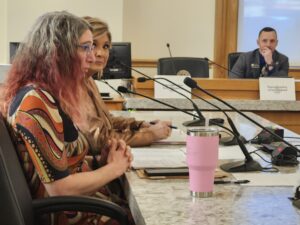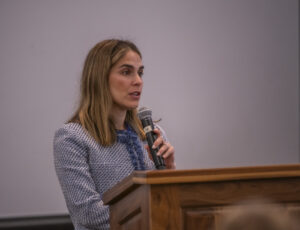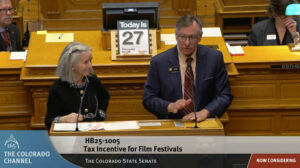The Sundance Film Festival is coming to Boulder — a relocation made possible in no small part by a $34 million incentive bill that business leaders have helped to push through the Legislature even in the face of bipartisan skepticism over the spending.
Leaders of the Sundance Institute announced Thursday that they will move America’s premier film festival from Park City, Utah to Boulder for at least a 10-year run beginning in 2027. The event last year attracted roughly 72,000 attendees whose spending generated $132 million in gross domestic product and created 1,730 jobs — numbers that Colorado leaders expect to duplicate in this state.
Just hours before that announcement, the Colorado Senate gave preliminary approval to House Bill 1005, which seeks to create a new refundable tax credit specifically to attract a world-renowned film festival, as well as a separate credit for smaller, local movie festivals. It got a big push from the Boulder Chamber of Commerce — plus the Colorado Restaurant Association, Colorado Chamber of Commerce and Colorado Competitive Council — to overcome questions from legislative Democrats and opposition from many Republicans.

Colorado state Reps. Brianna Titone and Monica Duran explain their bill involving incentives to attract the Sundance Film Festival to the House Finance Committee on Feb. 6.
Why incentives matter
HB 1005, sponsored by House Majority Leader Monica Duran of Wheat Ridge and fellow Democratic Rep. Brianna Titone of Arvada, offers up to $34 million over a 10-year period for festival organizers to cover expenses such as capital equipment, salaries and insurance. Colorado will disperse the money in annual allocations after each year in which the festival plays in Colorado and organizers prove they’ve sold enough tickets to earn the credit, with an extra $500,000 set aside per annum to go to local film festivals in smaller sums.
While many advocates pushing for the relocation talked about the benefits Sundance could bring to Colorado’s arts community and cultural offerings, HB 1005 allowed state leaders to pitch the bill in purely economic terms as a boost to businesses.
Colorado Office of Economic Development and International Trade Executive Director Eve Lieberman pointed out Sundance brings in 24,000 out-of-state visitors whose $106 million in spending creates an economic boon each year in late January and early February. Even with the expected payout of $34 million in tax incentives between 2028 and 2037, the state estimates a boost to its coffers of $16 million in tax revenue over that period, she said.

Eve Lieberman, executive director of the Colorado Office of Economic Development and International Trade, speaks at the Opportunity Now Regional Talent Summit in Arvada on March 18.
Jonathan Singer, senior director of policy programs at the Boulder Chamber, noted out-of-state guests will fill hotel beds all along the Front Range at one of the slowest times of the year. Rebekah Hernandez, manager of government affairs for the Colorado Restaurant Association, said tens of millions of dollars will go directly to restaurants who are still suffering from pandemic changes and see major slowdowns in winter.
“Special privileges going to the rich”?
“I come before you as a representative of a business community that needs a lift,” Boulder Chamber President/CEO John Thayer told the Senate Finance Committee on Tuesday, noting the high number of office vacancies and declining sales-tax revenue in his area. “What’s more, this surge in economic activity comes at a time in the middle of winter when the Front Range is experiencing its lowest ebb in visitor numbers.”
Rep. Bob Marshall, the Highlands Ranch Democrat who was the only member of his party in the House to oppose the bill, argued fiercely that if the festival will do so much for Boulder, the city should foot the bill for luring it rather than the state. Marshall fumed over Boulder leaders’ refusal to say how much they offered festival leaders — even after he filed an official public-records request with the city — and he ran an unsuccessful amendment to cut state incentives in half in the bill and require local governments to match the money, which would have placed half of the burden of the $34 million on the city and county hosting the film festival.

Colorado state Rep. Bob Marshall expresses frustration in a Feb. 6 committee hearing that Boulder-area leaders won’t divulge exactly what they have offered to attract the Sundance Film Festival.
“This is special privileges going to the rich and small crumbs going to the poor,” Marshall said in House debate on March 12, echoing questions Democrats had asked on how the public funds would help the state’s affordability crisis or benefit lower-income Coloradans.
But the benefits from Sundance will extend far beyond Boulder, business and economic leaders argued. One-third of out-of-state visitors’ spending in Utah goes to recreational and entertainment opportunities that will spill beyond Boulder borders when it comes here, Lieberman said. And numerous chambers from locales as far as the Western Slope submitted letters of support for HB 1005, understanding they too can see new visitors, said Meghan Dollar, Colorado Chamber senior vice president of government affairs.
Businesses will lead preparation to welcome Sundance
“This isn’t Uncle Chuck’s pork chop social,” said Nick Goins, president of Makeshift Film Group, in describing the reach of the event. “This is the largest independent film festival in the United States.”
After the bill flew through its first committee, opponents dogged HB 1005 by saying the state would not have to offer lucrative incentives to attract a major event if it were to roll back regulations and fees that have made it less attractive to businesses over the past six years. The bill passed the House on a vote of 43-17 — only five Republicans joined with Democrats in backing it — and a spate of “no” tallies are expected if it gets its final Senate vote as expected on Friday.

Colorado state Sens. Judy Amabile and Mark Baisley explain their bill to create a new film-festival incentive to the Senate on Thursday.
But Gov. Jared Polis never let down his argument, reiterated in a news release Thursday, that the festival will generate “even more jobs (and) a huge benefit for our small businesses including stores and restaurants.” And neither did area business leaders.
“The Boulder Chamber and the business community we represent understand what an immense responsibility we will be assuming with the selection of Boulder as the new host city for the Sundance Film Festival,” Thayer said in a news release Thursday. “The Boulder Chamber is full committed to playing its role in achieving those goals for the Sundance Film Festival.”
